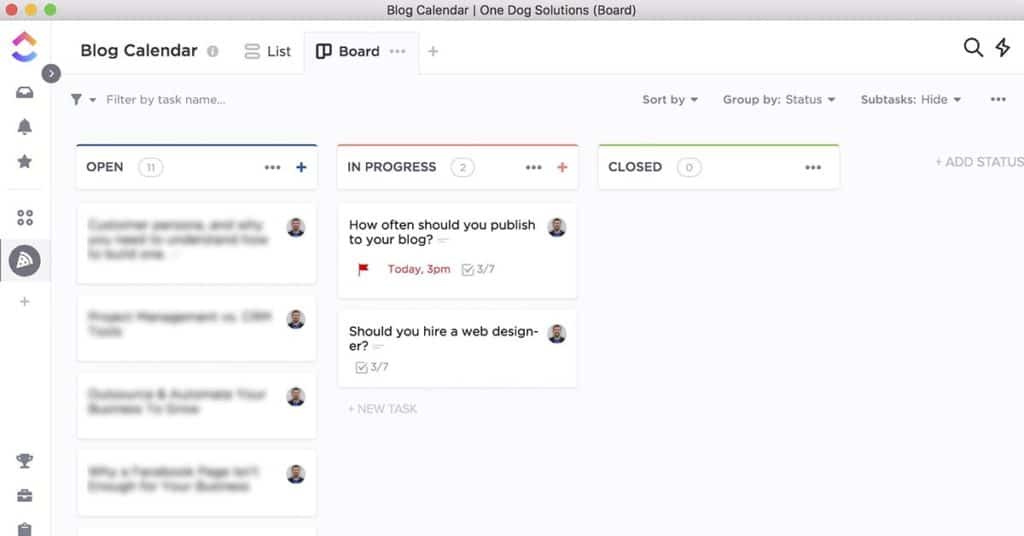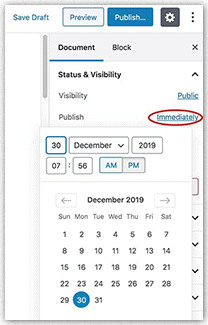How often should you post to your blog? It depends. Experts other than myself say once a week or more. Can you afford the time to post several well thought out and researched articles on your blog? Let alone in a week? Consistently? I talked about the time commitment in my first blog post about how blogging can help your business. Some articles with research, choosing the proper images and actually writing the blog can take 4 to 6 hours or more. Keep reading and we’ll cover some tips to help you create good habits on how to write your blog posts and publish them consistently.

Set a publishing schedule you can keep
Most small businesses do not have a dedicated in-house marketing team. Let alone one that exclusively focuses on creating content for the business. A lot of small businesses are just a single person. That means in addition to your day to day duties, you need to squeeze in some time to put on the marketing hat. Here’s where you need to be honest with yourself and think about how much time you can realistically commit to maintaining a blog.
As an example, at One Dog Solutions, we’ve decided that once a month will be our posting schedule. It’s realistic, and we can reasonably schedule it into our workload along with web design and marketing for our clients. Once a month posting is also one of the minimum frequencies that we recommend. Keep in mind, with a less frequent posting schedule, you will want to focus on more in-depth articles. You’ll need to provide more value to your audience with each article with this type of blog posting frequency.
Posting content on a regular basis is a solid foundation for your marketing that often only takes your time. Time is also a commodity that we’re often the shortest on. By identifying a sustainable schedule that you’re comfortable with, you’ll be on your way to blogging success.
What should I post to my blog?
People subscribe to blogs, magazines, and regularly curated content because it’s of interest or use to them. Topics that help people learn about a subject, or are discussing current events are possible topics. Focusing on topics relevant to you or your organization is important. Just like schedule consistency, the topics and themes of your blog need to be consistent.
Recurring Questions
Answer recurring questions about your business in a blog post format. Do you have multiple customers contact you to ask a particular question often? Does it take more than a few minutes to explain? Having this information available will help customers looking for the answer to find you in searches. You can also easily direct them to the article for more in-depth information when you do get the question.
How-to Articles
Doing a walkthrough or a simple how-to article is another good idea. Blog posts are great for customer education and training. Writing an article that educates your audience can help make your work easier as well. When everyone is on the same page, you can focus on more complex problems. Blog posts like these also help establish you as an authority on the subject.
Current Industry Changes
Talking about changes in your industry or niche is always a good topic. Search engines are your friend when you want to know about the latest changes that can affect your business. If you’re asking the question, chances are that your customers are too. Give them an answer in a blog post.
Customer Success Stories
Customer success stories are a great way to advertise yourself. When you receive a great testimonial on a project that went well. Tell people about it. Publish an article about why you’re the best at what you do.
This is hardly an exhausting list of possible topics, but it will give you an idea of what you might want to write about. Keep the topics consistent and relevant to your organization and audience.
Plan out your blog ideas
After you have a list of blog topics, it’s time to filter them. Narrowing the field down to relevant ideas is where the planning begins. Group your ideas so that they correspond to categories of your blog.
Organizing your blog topic ideas in Google Sheets is an easy way to track them if you’ve signed up for G Suite. If you need more advanced scheduling, productivity apps like Trello and ClickUp can also help you keep your ideas organized and keep you on task as well.

Don’t get caught up in the tools. Even something as simple as writing down your ideas on a whiteboard, can help organize your thoughts. By organizing your content and writing about topics consistently, your readers will want to come back for more. Writing about topics within a category will help establish an authority around that particular subject. This will help move your posts closer to the top of search results.
Keeping yourself accountable

Schedule your blogs out once you’ve got your topics organized. Build a content calendar and assign your blog posts dates that fit the publishing schedule that you’ve chosen. Schedule time to research and write your blog. This is probably more important for many people than the publish date. Some topics will take longer to research than others.
Write multiple articles in a session. Grouping similar tasks together is a strategy that we employ often to be more efficient. It can work with your blog writing as well. WordPress and other popular blogging platforms allow you to schedule your posts. If you’re a “work when the inspiration hits” type of person, this can be a good strategy. The important part to remember is to post on your schedule.
Some closing thoughts
This article was geared toward blogging for a business or organization, where the self-produced content isn’t you’re primary job. That’s not to say that other blogs can’t pick up tips here. Key things for any blogger to remember, produce good content on consistent topics, and produce it regularly on a consistent schedule. If you have a lengthy break between postings, you’ll need to write longer content than a daily blogger.
Producing content is work, but it doesn’t have to be hard work. Just like a New Year’s fitness resolution, the blogging exercise gets easier the more often you do it. And just like the New Year’s workout resolutions, some people choose to work with a training coach. Feel free to reach out to us at info@onedog.solutions if you have any questions or need help with your content!

